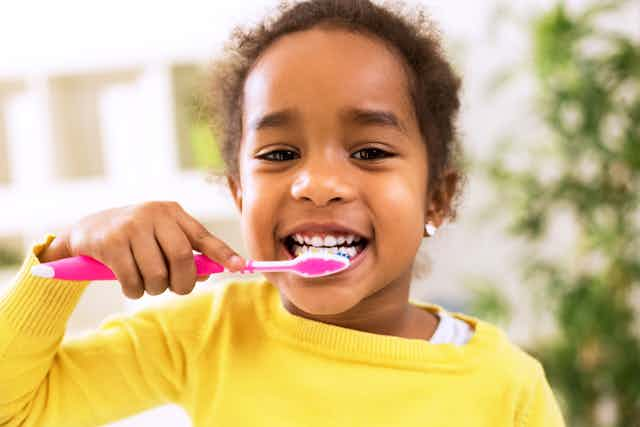Nearly a quarter of five-year-old children in England have tooth decay. In deprived areas of the country the proportion is even higher. And it isn’t just one problematic tooth – children with decay have, on average, three or four affected teeth. It’s the most common reason why young children aged from five to ten years are admitted to hospital.
When Labour leader Keir Starmer announced the party’s intention to expand toothbrushing programmes in nurseries and schools, he faced criticism for planning to take away responsibility from parents and place further burden on schools.
But supervised toothbrushing for young children already takes place. It has been rolled out in Scotland and for deprived areas in Wales and takes place in some areas in England. It is effective in reducing tooth decay, especially for children in deprived areas. It is not meant to replace brushing teeth at home, but strengthens good oral health practices.
As experts in dental health, we know all too well the impact poor oral health has on the lives of children and families. We are leading a project to improve toothbrushing programmes in nurseries and schools in England, and have recently developed an online toolkit to help schools, nurseries and parents as well as the NHS and local government.
Painful – and preventable
Tooth decay causes pain and suffering. It affects children’s daily lives, including what they eat, their speech and their self-esteem. It stops them from doing things they enjoy and can cause disrupted sleep. And tooth decay has an impact on school readiness and attendance. Children have to take time off school due to toothache and to attend dental appointments.
While going to hospital for dental extractions under general anaesthetic reduces the impact of decay on children’s lives, the event itself can be worrying for children and their parents. And poor oral health in childhood has lifelong consequences. Children with decay in their primary teeth are four times more likely to develop decay in their adult teeth.
In England, treatment of decay in children and teenagers cost the NHS over £50 million in the financial year 2021-22.
Toothbrushing at school and nursery with a fluoride toothpaste for young children is a way to tackle this issue.
On the curriculum
Supervised toothbrushing involves children brushing their own teeth as a group during the day, overseen by nursery and preschool staff or teaching assistants. It typically takes between five and ten minutes.
In Scotland, the Childsmile Toothbrushing Programme is offered to all children aged three and four at nursery and to some younger nursery children as well to some older school children. Research analysing the programme has found it to be effective in reducing tooth decay, especially in children at greatest risk, such as those living in areas of social deprivation. In England, though, uptake of toothbrushing programmes is currently fragmented.

What’s more, oral health is already part of children’s learning at nurseries and schools in England. The topic is included in statutory guidance for primary and secondary schools. Similarly, promoting oral health is included in the statutory framework for early years settings such as nurseries.
Running a supervised toothbrushing scheme is one way early years settings can demonstrate they have met the requirement about oral health.
Supervised toothbrushing in nurseries and schools does not replace toothbrushing at home. It serves to complement home toothbrushing to help young children learn and practice good oral hygiene.

